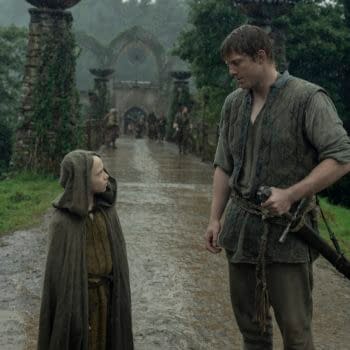Posted in: BBC, Doctor Who, TV | Tagged: alex kingston, arthur darvill, bbc, doctor who, Karen Gillen, matt smith, neil gaiman, russell t davies, steven moffat
Doctor Who Series 6: Revisiting The "Too Much" Peak of The Modern Era
Doctor Who Series Six was when the modern era of the show hit its peak in popularity but also when it started to become too much.
The BBC has released a compilation video of the best moments from Series Six of Doctor Who on the show's official YouTube channel, and it's worth a reassessment as the messiest season of the show's modern era since it came back in 2005. This was Steven Moffat's second season as showrunner, with Matt Smith, Karen Gillen & Arthur Darvill as the Eleventh Doctor and companions. You could say it was in this season that the show's flaws first started manifesting, the seams starting to show.

Series 6 was also the start of Doctor Who's emergence as a global pop culture phenomenon. BBC America came on board as a co-financier for the show, which increased its budget and enabled them to shoot on location in the U.S. for the first time and let Moffat come up with stories set in the US. Moffat and the cast were flown to the US for the first time to promote the show with lavish red carpet-style premieres in New York City with hundreds of cosplaying fans attending. He had the Doctor go up against The Silence in the White House, though that was shot in a studio in Cardiff, and nearly all the actors playing Americans were British.
In many ways, this was the peak of modern Doctor Who. Under Moffat, this season was maybe a bit too much. Too much self-reflexive continuity verging on fanfiction, too much of the drama, and too many high-concept Science Fiction ideas. We're amazed at how much of the season we actually forgot beyond some of the classic ones, like the episode Neil Gaiman wrote where the TARDIS got a human body and talked to the Doctor for the first time. That was probably the best episode of the season, marrying Gaiman's recurring theme of romance and heartbreak that gelled perfectly with Moffat's sensibilities.
Doctor Who Became Too Much
Moffat recently admitted he often didn't have a grand plan or grand theme and that he stressed out about just having new stories to make the number of episodes commissioned for his seasons. Yet this season was surprisingly coherent with its overall arc that doubled back and revealed its real twists in the final half. The "too much" of it was the convoluted revelation of the true identity of River Song (Alex Kingston), the bit that turned the eternal question of whether to kill Hitler into a gag, the cross-galaxy conspiracy to take down the Doctor, how the Doctor cheats death in the most contrived piece of plotting in Moffat's whole career, the show was starting to eat its own tail. It was approaching Marvel Comics' level of impenetrability. It fell a bit too much in love with its own cleverness. Everything right and wrong about Doctor Who is in this season, for better or for worst. The worst part is that this was the season where the show started to feel normal rather than something forever fresh and surprising, which are elements Russell T. Davies needs to rekindle when he brings back the show in the Fall.














